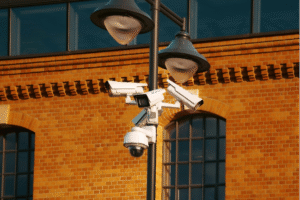Texas enforces strict licensing to ensure safety and professionalism in the private security industry. Breaking into Texas’s private security industry starts with a license! This guide walks you through obtaining a Class B Security Contractor License, covering video surveillance, alarms, intercoms, and access control.
Introduction: Why Your Texas Security Business Needs a License
In Texas, the private security industry is regulated by the Department of Public Safety’s Private Security Program (PSP) under Texas Occupations Code Chapter 1702. Any business providing alarm installation, access control, or other electronic security services must hold a valid company license, and technicians must also hold an installer license under that company license.
⚠️ Warning for Business Owners
Operating or hiring without a valid Texas security license is a Class A misdemeanor.
- Fines up to $4,000
- Jail time up to 1 year
- Owners and managers face the same charges as unlicensed staff
- Civil lawsuits can cripple your finances and reputation
Get licensed—or risk losing your business.
Decoding License Types: Are You a Class A, B, or C?
Before beginning the application process, it is essential to identify the correct license classification for your business’s scope of services. The Texas DPS issues three primary company license types:
Texas Company Licenses
Class A – Private Investigation Company License
Scope: Specialized for companies providing private investigative services.
Services Include:
- Surveillance and fact-finding
- Background checks
- Fraud investigations
- Locating missing persons or assets
- Insurance investigations
Note: This license is distinct from the Class B license, which covers broader security services.
Class B – Security Services Contractor Company License
Scope: Covers a wide range of security services.
Services Include:
- Alarm systems (includes video surveillance and monitoring)
- Electronic access control installation
- Armored car services
- Courier services
- Guard services (armed or unarmed)
- Locksmith services
Note: This license is for companies offering one or more of the above services.
Class C – Private Investigation and Security Contractor Company License
Scope: Combines the services of both Class A and Class B licenses.
Services Include:
- All services are covered under Class A and Class B licenses
Note: This license is for companies that wish to provide both investigative and security services.
The Single Biggest Hurdle: The Primary Company Representative (PCR)
For any new security business in Texas, one of the biggest—and often overlooked—challenges is fulfilling the requirements for the Primary Company Representative (PCR). This is more than a title; the PCR is the individual legally responsible for the company’s compliance with all state security laws and regulations. The DPS directs all official correspondence to the PCR and holds them accountable for maintaining compliance. To qualify, a PCR must:
- Pass a rigorous examination
- Meet strict industry experience requirements for each license area
- Attend annual audits at the DPS Texas Office or Contractor Office
- Maintain company records on a monthly basis
Start your security business the right way with License for Security. Our expert consultant can act as your official Primary Company Representative (PCR), getting you legally licensed and fully operational—fast. We’re not just advisors; we’re your regulatory foundation for growing a successful security business!





